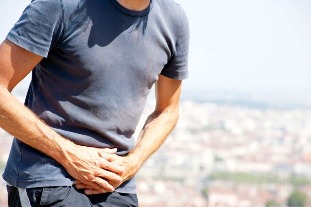Prostatitis is the most common urologic disease in men over the age of 45 years. According to the statistics, with the or the noi of the form of the inflammation of the prostate faces one of every two men. The disease is characterized by disorders of urination and the pain tolerance of the syndrome. Initiated the form of the disease is severe and fire problem, so the treatment of prostatitis should be started promptly.
General causes of the development of the disease

To understand that the disease of the prostate and why it appears, it should be understood with the operating characteristics of the prostate. This hormone-dependent organ, plays a vital role – it ensures the viability of the sperm after ejaculation, allowing them to advance to the egg. This function has a special secret, which is mixed with the substance and is around a third of the volume of the seminal fluid.
The causes of the development of the disease can be divided into general, which increase the risk of inflammation and specific characteristic of a certain form of inflammation.
The disease develops due to the following reasons:
- the lack of sexual life regular;
- the supercooling;
- the infection of the authority;
- bad habits;
- obesity;
- constipation;
- physical inactivity;
- cardiovascular disease;
- factors of stress.
The lack of sexual life regular, which leads to the development of a stagnation of the processes that cause inflammation. For the functioning of the prostate gland should be checked and participate be emptied, which can be achieved only through sexual intercourse. When the masturbation occurs to the incomplete emptying of the cuttings of the authority, which is not a substitute to the natural separation of the secretion of the prostate, as in the time of full sexual act.
The subcool the lower part of the body leads to irritation of the prostate. This weakens the immunity and can be a cause of penetration into the prostate opportunistic microorganisms, always present in the human body. The infection of the prostate gland occurs in several ways:
- with the current of the blood, if you have the focus of chronic infection in the body;
- with the flow of the lymph, infectious diseases, inflammations of the organs of the pelvis;
- by the return of release of urine or ejaculation, when sex, infections, cystitis and diseases of the kidneys.
Bad habits exert an indirect influence on the development of prostatitis. The case is that with age the prostate will produce natural changes. After approximately 50 years, it slows down the selection of male sex hormones, when the prostate increases in size. This leads to the slowness of the processes of change and under the influence of a series of negative factors, including smoking, alcohol, appear fenmenos stuck in the authority. Non-inflammatory disease, associated with the enlargement of the prostate gland due to the natural aging process, has similar symptoms and is called the adenoma or hyperplasia of prostate.
Another factor that acts on the cause of the development of the disease in men is obesity. The altered metabolism leads to a slowdown in all of the processes that occur in the body. This violates the normal trofiku of the prostate gland, alters the circulation of the authority, develops the stagnation of the prostate secret. As a general rule, in case of obesity, men are the sedentary lifestyle and do not adhere to a proper diet. Physical inactivity leads to the deterioration of the blood circulation to the pelvic organs, bad diet causes constipation.
Violation of defecation throughout the accumulation of the masses of stool in the bowel puts pressure on the prostate and annoying) of the authority. During the emptying of the intestines of solids of the masses stools pass through the rectum, injury to the wall. In a certain place in the prostate gland almost touches the rectum, therefore, at the time of the difficulty in bowel movement occurs irritation of the authority, which in certain circumstances can be one of the causes of the development of prostatitis. Like constipation alters the circulation of the blood to the organs of the pelvis, which leads to the development of fenmenos stagnant in the prostate.
Cardiovascular diseases and stress weaken the body. And in the first and in the second case, there is a violation of the circulation of the blood, in particular in the organs of the pelvis. In diseases of the cardiovascular system worsens the transport of oxygen to the cells of the authority, and the stress violates all of the metabolic process and weakens the immune system. Diseases of the vessels, influences negatively the function of the prostate, also can be attributed to varicose veins.
None of these reasons, in addition to infectious diseases, it is not a fundamental factor for the development of the disease. Examined the reasons for this are only risk factors that determine the development of prostatitis, but increase the risk of this disease. As a general rule, the prostatitis in men develops in the presence of multiple risk factors. In addition, for each type of disease is characterized by their triggers.
Types of diseases

Exactly understand what is prostatitis, in a broad sense, it will help the understanding of the causes of development and the species of the disease. There are two main types of inflammation in the prostate is infectious and non-infectious prostatitis.
An infection of the prostate is an acute inflammatory process in the prostate caused by infection of the authority. This form of the disease is characterized by the accentuated of the sintomatologa, very affect the patient's quality of life, but rather is treated successfully, if the patient in a timely manner will be directed to your doctor. The causes of this type of inflammation – a variety of viruses, bacteria and fungi. The pathology is rapidly developing in a matter of days, is characterized by the worsening of general well being and fever.
The infectious disease in the tissue of the prostate appear the foci of inflammation. There are several forms of this disease, which are distinguished by the degree of involvement of the prostate tissue in the inflammatory process. An infection of the prostatitis may manifest of local foci of suppuration and abscess of the prostate.
Non-infectious prostatitis is a consequence of the lack of sexual life regular, the blood system and the stagnation phenomena in the organs of the pelvis. The inflammation of the world's nature develops slowly and often happens in chronic form. This type of disease is characterized by moderately symptomatic, a long time, however, there may be episodes, when all the symptoms are aggravated and the signs are not contagious of prostatitis reminiscent of an acute inflammatory process.
According to the statistics, the chronic prostatitis is diagnosed 80% of the patients in clinical urological. Acute infectious inflammation only one of every five patients. When this chronic non-infectious prostatitis, and to a greater extent refers to the age, disease, as well as the mean age of the patients 45 to 60 years, and an inflammation is often diagnosed in younger people who live an active sexual life.
Infectious causes of prostatitis
The prostate is essential in the male organ, the inflammation that develops prostatitis. A form of the disease is a serious problem, which often face young men. The reason of the infection prostatitis "rejuvenates" is erratic sexual relations between young people and prior to the start of the sexual life.
Quite often the cause of infection of the inflammation acts:
- chlamydia;
- gardnerellosis;
- trichomoniasis;
- the gonorrhea.
All these bacteria are transmitted by sexual intercourse. The feature and the main danger that threatens the health of the prostate is asymptomatic for the following conditions in men. If women can detect and cure the disease caused by the bacteria transmitted, the men appear disease manifest specific symptoms very rarely. As a result of the bacteria time to "live" in the body, to the surprise of genital area. Under the influence of a number of factors (reduction of the immunity, hypothermia, stress) the bacteria enters the canal of the urethra in the prostate gland. Due to the features of the structure of the authority, the inflammatory process develops very quickly.
Sexually transmitted infections, they become the cause of the development of inflammation around 10% of cases of infections of the prostatitis. In the rest of cases, the cause act of shareware pathogenic microorganisms, which are always found here in the body of the men:
- e. coli;
- pseudomonas aeruginosa;
- staph;
- the streptococcus.
Prostatitis, caused opportunistic organisms, it develops quickly and often happens in the severe form. For example, if the cause of the disease acts as the staphylococcus, at the prostate to form ulcers, and high risk of development of an abscess. Infection of the prostate gland by these microorganisms occurs hematogenous by the presence of a focus of infection in the body. These pathogens can penetrate the prostate upside down zabrose of urine from the urethra at the bottom of the cystitis of infectious diseases or the kidneys.

Separately distinguish fungal prostatitis. This pathology is very rare, but is difficult to treat. The cause of the advocate by fungi of the genus Candida albicans. This fungus is an important part of the ediacarense normal gut and mucous membranes of humans, however, for various reasons, may give rise to the appearance of the inflammation. This occurs due to the increase of the fungal population. The infection of the prostate pathogens ediacarense usually occurs when there is genital candida (candidiasis) in men. This disease may occur due to immunodeficiency, but also can be transmitted by sexual contact. Fungal prostatitis a long time asymptomatic, and when the first symptoms appear, treatment is complicated by the fact that the ediacarense pathogenic develops quickly resistance to the action of the medicines. Fungal prostatitis usually turns into a chronic form.
Causes and characteristics of development are not contagious of prostatitis
To discover symptoms of prostatitis, it is important to timely consult with your doctor and determine the type of disease. Non-infectious prostatitis may be the result of:
- irregular sexual life;
- violation of the circulation of the blood;
- bad habits;
- the physical inactivity.
The disease usually develops as a result of the action simultaneously of all the aforementioned factors. The average age of patients who experience non-infectious prostatitis – 45 years.
Doctors agree that the high prevalence of the infection prostatitis should be modern pace of life. The majority of men today are busy in sedentary work, which denies the physical activity. Physical inactivity takes scale momentum due to the lack of time for sport. This leads to problems with the spine, which reduces the circulation of blood in the lower part of the body. Unbalanced diet leads to constipation, which most violates trofiku of the prostate. The situation worsens with the lack of sexual life regular, that is a consequence of the lack of or permanent companion, or the banal to the shortage of time. To the development of diseases are cause of chronic diseases and pathologies of the cardiovascular system, for example, the hipertensin, which affects men over the age of 40 years. Add to this the constant stress, and smoking, generating the typical portrait of a sick man is not infectious prostatitis.
A feature of this disease:
- moderately expressed by symptoms;
- the violation of the erection;
- impairment of fertility;
- the long-term.
Non-infectious prostatitis very often comes in a chronic form. The disease is difficult to submit to medical treatment, if the man do not want to review your lifestyle and give up bad habits.
Factors aggravating the course of the disease – imbalance of the diet, often the stress, the lack of timely treatment. The exact symptoms of signs and symptoms of prostatitis depend on the form of the inflammation.
The diagnosis of the disease
To discover the discomfort, the violation of ejaculation, or pain, the man should be addressed as soon as possible to a doctor.
Prior to the surveys, the doctor will examine a patient's physical and will discuss the complaint. Be sure to tell your doctor about the availability of the temperature, symptoms of intoxication – this will help you to find the correct tactic of the survey.
For the diagnosis of functional disorders of the prostate apply:
- the prostate massage;
- The ultrasound and the ETR of the authority;
- general and biochemical analysis of the blood;
- analysis of urine;
- Ultrasound of the bladder and of the kidneys;
- the analysis of the secretion of the prostate;
- the analysis of PSA.
Initial assessment, which maps to all the men, except that they are suspected of prostatitis acute bacterial is a prostate massage. The procedure is painless, but it causes psychological discomfort. The massage consists of the in which the doctor inserts a finger into the anus of the patient and feels the prostate. In view of the diagnosis can be put by the nature of the changes to the contours of the authority, its density and size. When you perform a prostate stimulation, as a result of which, the urethra are are several drops prostate secret. This material is sent to the laboratory for analysis. This study allows to identify:
- the presence of inflammatory process;
- the nature of the inflammation;
- the causative agent of the disease;
- the sensitivity of the pathogen to antibiotics.

In acute bacterial inflammation, when the man, a high-temperature and there is the risk of an abscess or purulent defeat of the authority, massage perform contraindicated. Moderate inflammation or in the beginning of the development of the infection of the prostatitis, the doctor feels the prostate with much care, avoiding strong at the same time and the stimulation is very intense.
Identify the type of excitation in acute inflammation, helps in the urine test. The fact that in the urethra particles remain prostate secret, and when you urinate that are washed from the urethra. The analysis allows to disentangle the secret of the prostate of the urine and determine the type of stimulating inflammation.































